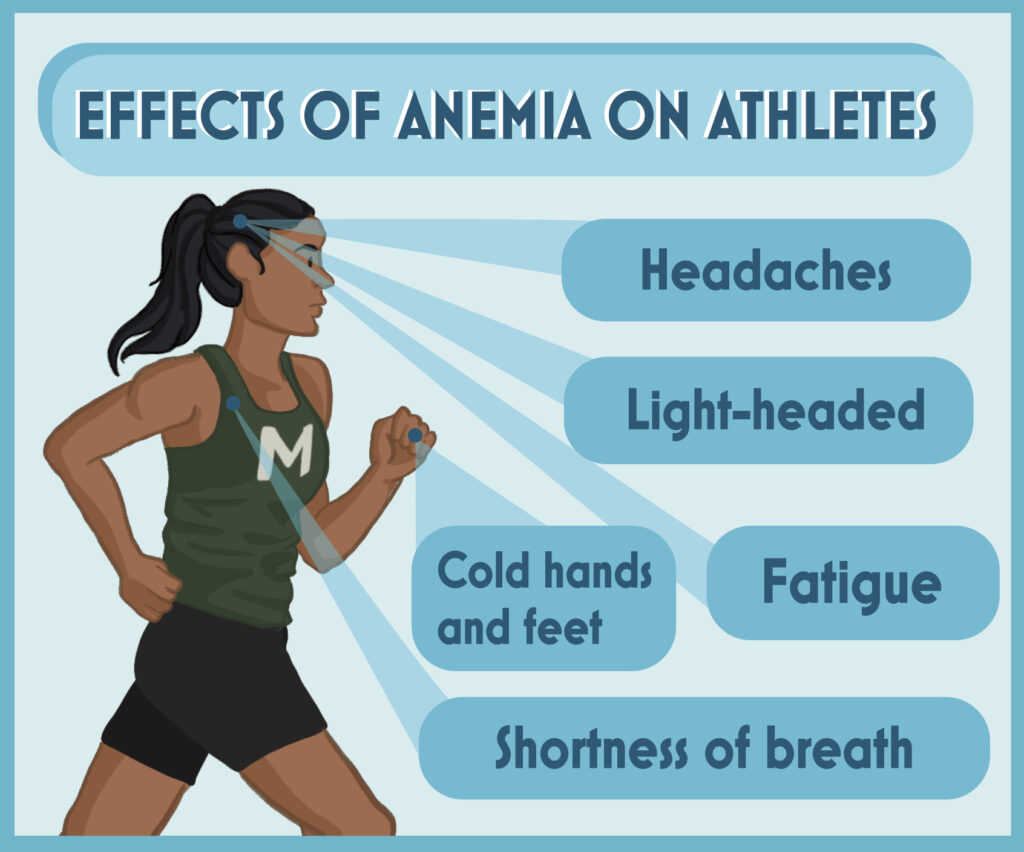Athletes and anemia: coping while still trying to compete
Khusbu Patel | The Chronicle

Mason volleyball player Sydney Grebe knew she was going to be facing some difficult opponents this year, but she did not plan on battling a mysterious illness that sidelined her for a portion of the Comets’ season.
When Grebe started to experience chronic fatigue, loss of hair, ear ringing and brittle nails, she knew something was wrong.
“My body was shutting down,” Grebe said. “I was so tired all the time; my hair started falling out. I didn’t really understand why or how. I didn’t know what was going on.”
After a trip to the doctor, she was diagnosed with anemia. Anemia is a condition that reduces healthy blood cells that are responsible for transporting oxygen throughout the body. The lack of oxygen can cause dizziness, lightheadedness, shortness of breath and an irregular heartbeat.
After an off-season of conditioning and training in preparation for the 2022 season, Grebe was looking forward to making significant contributions to the team. Her diagnosis forced her to alter her plans. She was sidelined for three weeks where she could not play or practice. She became hospitalized and had to undergo three intravenous iron infusions.
“It was super hard; I couldn’t practice a lot, and when the iron finally started working it was the end of the season already,” Grebe said. “I was definitely not a starter anymore.”
Typically during workouts, athletes develop more stamina, however, Grebe said that she was confused as to why she was not seeing any improvement during her training sessions. While her diagnosis helped her better understand what she was up against, it took a toll on her emotionally because she wanted to get back out on the court.
“It was just frustrating overall – not being able to play when you know that everything in you wants to play, but you physically can’t because you’re so tired,” Grebe said.
Anemia might have held Grebe back, but she has no plans of quitting the game she has loved playing since she was a little kid.
“Volleyball has been a part of my life since I was seven years old,” Grebe said. “Every single time I think about quitting or I doubt myself, I look back to that seven-year-old girl that fell in love with it”.
Varsity Cross Country runner Sharanya Nair was diagnosed with anemia during her freshman season after experiencing severe dizziness, shortness of breath, and sharp respiratory pains.
“I was consistently dropping times when I ran meets and then all of a sudden, I just stopped and I couldn’t break past a certain time,” Nair said.
As the roster for varsity meets gets more competitive, Nair had limited opportunities to be selected. With her iron levels being inconsistent, her times fluctuated, making it more difficult to qualify for select meets.
Nair was a passionate runner who was determined to set personal records this season, however, her condition proved to be troublesome, physically and emotionally.
“For someone who really enjoys running, [anemia] will cut your season short and stop you from trying to get any of those opportunities,” Nair said.
Anemia, caused by iron deficiency, is relatively common in female athletes. Some treatments include supplementing their diet with daily iron pills, eating foods rich in iron and consuming vitamin C to help the body’s absorption of iron.
“I have to plan my entire diet and my day around when to take the tablets and it really just affects your entire lifestyle,” Nair said.
Nair said that practicing with anemia feels like “running through the mud,” putting her at a severe disadvantage.
“Throughout your entire life, you’re not going to be as good at sports as other people who don’t have to worry about [anemia],” Nair said. “Even if I consistently have my pills and I somehow manage to get my blood work back to a normal level, my iron will still be at the bottom end of the spectrum”.
Due to her condition, Nair has been forced to withdraw from races and on multiple occasions required medical attention.
“I’m not like some people [who] just go out and run the race,” Nair said. “For me, it’s a matter of [whether] I will be able to finish safely.”
Nair said that her condition makes her question her dedication to cross country. However, despite her doubts, she continues to persevere and plays the sport she loves.
“I remind myself that even if I always have to struggle through this impairment, I genuinely love running. It’s a passion that I’ve always had, and can be good at. I’m just gonna have to push through and continue working hard.”
Infographic by Allison Droege
